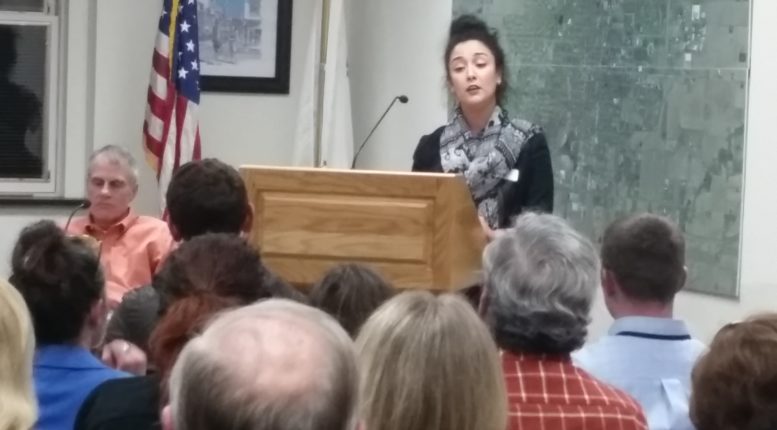By JAN LARSON McLAUGHLIN
BG Independent News
Bowling Green was told it could be better – and City Council accepted the challenge.
The failure of a sanctuary campus proposal at BGSU Tuesday afternoon was followed by the passage of an anti-discrimination resolution by BG City Council that same evening.
One by one, students of color walked to the podium at the packed city council meeting, to tell of their negative experiences and their positive hopes.
“I came from a country where I was tear gassed,” during the Arab Spring uprisings, said Amira Hassnaoui, a BGSU student from Tunisia. She came to a country where she could be free – or so she believed. “This is a dream land where everybody can be who they are.”
There is no tear gas here, but Hassnaoui is again finding herself fighting for rights.
“I’m going to fight for social justice in the U.S.,” and speak out for those unable to, she said.
Hassnaoui, who is president of the BGSU Graduate Student Senate, said while she does not wear a hijab, some of her Muslim friends do. She told of walking around a local business, and being followed then questioned by the manager.
“This resolution should be passed. Nobody should walk in fear because of who they are,” she told city council.
Hassnaoui said she worries about her mother and brother traveling to the U.S. for her graduation. Her mother wears a hijab and does not speak English, and her brother is dark skinned. Though the hate crimes reported around the nation have not occurred here in Bowling Green, Hassnaoui said the resolution could prevent those incidents from happening.
“I do believe we don’t have to wait for a situation to occur,” she said.
She also reminded council of the importance of students in the city. “We should provide a safe space for our international students. If these students do not feel safe,” they will go elsewhere and there will be an economic loss for the city, she said.
The resolution passed by council condemns violence, hate speech and discrimination targeting Muslim people and expresses solidarity with the Muslim community and all those targeted for their ethnicity, race or religion.
Ahmad Mehmood, a student from India, said the resolution is more than symbolic for international students.
“This is significant. This is not symbolic,” Mehmood said. “This is not just hypothetical, this is real.”
Another student, a second generation Latino in America, spoke of his fear of Donald Trump’s promise to deport undocumented immigrants. There are many of those people in Bowling Green workplaces and neighborhoods, “whether you recognize it or not,” he said.
Student Bea Fields said her father, from Ghana, is one of those undocumented immigrants. “I don’t know what’s going to happen to him,” she said.
Fields has faced her own issues, with her partner being a white woman. She told of walking past Dunkin’ Donuts, holding hands, “not hurting anyone.”
“A cigarette was flicked in my girlfriend’s face,” Fields said.
She presented city council with the challenge.
“Bowling Green, you have the opportunity to be better. Bowling Green, you have the opportunity to be best,” Fields said.
The resolution was written by council member Daniel Gordon. He noted that Bowling Green is not immune from the hatred being expressed around the nation. During the door-to-door food collection for Martin Luther King Jr. Day, one of the volunteers was reportedly called the “N” word.
Emily Monago, of the city Human Rights Commission, said the resolution shows Bowling Green cares about its diverse community. “We will not tolerate hate,” she said.
Mayor Dick Edwards also spoke in support of the resolution, which calls on council to:
- Condemn all hateful speech, violent action, and discrimination directed at Muslim people and those perceived to be Muslim anywhere in the city or outside the city;
- Reject political tactics that use fear and misinformation to manipulate voters or to gain power or influence, and commits to prevent this from happening in the City of Bowling Green;
- Commit to pursuing a policy agenda that affirms civil and human rights, and ensures that people subjected to hate speech, violence, or discrimination on the basis of race, religion, or immigration status can turn to government without fear of recrimination;
- Reaffirm the value of a pluralistic society, the beauty of a culture composed of multiple cultures, and the inalienable right of every person to live and practice their faith without fear;
- Urge the citizens of Bowling Green to increase their involvement with the Human Relations Commission, Not In Our Town, and other community organizations, programs, and events that promote these principles, including by engaging with the local Muslim community and in partnership with other faith communities, to help sustain a culture of peace and understanding in Bowling Green.
“Bowling Green sets an example to other communities by standing up to hate. I am proud that we have civic institutions undertaking meaningful and necessary work to stamp out hate,” Gordon said.
“Bowling Green is a better place to live because of the work of Not in Our Town, the Human Relations Commission, and Bowling Green State University,” he said. “But they should not be alone in that work. We, as elected officials, have a moral responsibility to show that we stand with all our citizens. City Council cannot just leave all the substantive work to these groups and feel it has done its part. We must engage, too. We must share the responsibility.”
Council member Bruce Jeffers suggested that the resolution be given second and third readings Tuesday evening so it could proceed. The resolution was passed with unanimous support, with member John Zanfardino absent.
Council member Sandy Rowland said it was good to see so many BGSU students participating in the city council meeting. She encouraged them to continue. “This is your town,” she said.

